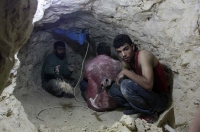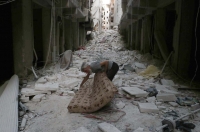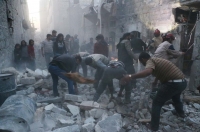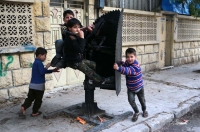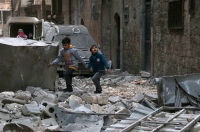Working in a town turned into a cemetery
PARIS, September 18, 2015 - In Aleppo, almost every public garden has turned into a cemetery.
There are no more restaurants, no more leisurely distractions, no more happiness. Several times a day, you hear Bashar al-Assad's army planes passing overhead. You are never safe.
Each moment of each day, when you walk in the street, when you're at home or at the mosque, you risk death. You can face a barrel bomb at any minute.
One day I was sitting and talking with someone, and the next day I learned that he was dead.
In 2011, I was 19 years old and studying computer science at the University of Aleppo. I had never taken photos, but when the revolution began, I bought a camera and began filming and photographing anti-regime protests for local media.
I was arrested during a protest and spent one month in prison. When I got out, I began taking photos for the Aleppo Media Centre (AMC) in the part of city controlled by the free Syrian army. In 2014, I got in touch with AFP through a friend, and they began buying my photos.
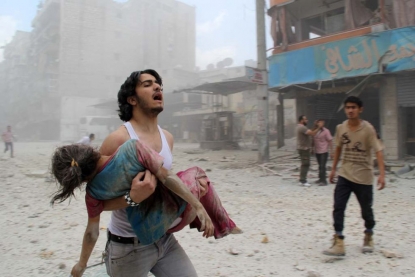 A man carries his sister, who was injured in a barrel-bomb attack by government forces against a rebel-held district of Aleppo on June 3, 2014 (AFP Photo / Baraa Al-Halabi)
A man carries his sister, who was injured in a barrel-bomb attack by government forces against a rebel-held district of Aleppo on June 3, 2014 (AFP Photo / Baraa Al-Halabi)Recently, I won a prize at the Fujairah international photo contest (FIPCOM) for the image above. I took it on June 3, 2014. It was presidential election day, when Assad won a new term with nearly 90 percent of the votes. While people went to cast their ballots in parts of Aleppo controlled by the regime, the war on opposition-held areas just a few metres away continued.
I was in my car when a bomb went off near me. In front of me, through the dust, by a damaged mosque, I saw this young man running towards a truck with rescue workers carrying his sister in his arms. She looked badly injured or possibly dead... I never found out what happened to the two of them.
A way to show the world what exactly is going on here
I am proud to have won this FIPCOM award, but I hope people will see beyond this photo.
Syria is more than images of bombs and suffering. It is a place where people want freedom, where people want to build their country. With time, I learned to love my new profession. But photography isn't simply a hobby for me. It's a way to show the world what exactly is going on here.
If I stop, if my friends stop, the regime will simply launch more barrel bombs at Aleppo, and nobody will know.
I live and work in opposition-held Aleppo, so my movements remain relatively free. There is intermittent internet access. We can buy SIM cards for $2, and get WiFi on computers connected to generators or car batteries. At AMC, we organised a sort of monitoring system on Facebook. We have correspondents in different parts of the country who can alert us when something happens. So when we hear of a barrel bomb explosion, we can all go out to do our work.
Click on an image to launch the slideshow
Sometimes we are hardened by our work, but there are still moments when I cannot bear to take a photo, when what I see is unbearable. For example, when a regime barrel bomb strike in May killed more than 70 people at a market in Aleppo, I couldn't bring myself to take photos. I couldn't bear the carnage I was seeing, all I could do was sit down and weep.
But then my friends and colleagues at AMC helped me back up, and encouraged me to continue. So I began working again.
Sometimes people are hostile towards me as a photographer. When there is a deadly attack and people are there digging out dead bodies surrounded by people covered in blood, some don't want photographers there. They might think that it's because of us that things like this happen. We draw attention to them and to their neighbourhood. When I'm faced with sentiments like this, I try to clear out as soon as possible.
Elephant rockets
The people of Aleppo love winter because it brings the clouds. It makes it harder for Assad's planes to fly and to drop bombs on us.
The noise of planes haunts us. They come at the same time almost every day -- either in the morning or in the evening.
During the day, we have a few seconds to predict where the barrel bomb will fall. But during the night its a whole different story, it's much more dangerous. It's dark and there's no way to know where the bomb will hit.
The regime also uses "elephant rockets", or bombs with rockets attached to them. When they're launched they make a mournful trumpet sound -- giving them their name -- and it's extremely difficult to predict where they will land.
Before, I went to Turkey every two to three months just so I could breathe. But the border closed recently and it's increasingly difficult to cross into Turkey. Now I have to pay a smuggler around 400 dollars just to get through. So I no longer have a safe place to go to regain my bearings and catch my breath.
Now I'm in France to receive the FIPCOM prize, but I'm constantly thinking about my wife, my family and my friends who stayed in Aleppo and risk their lives every day. The war is always on my mind.
Baraa al-Halabi is a freelance photographer based in Aleppo who regularly works with AFP. Follow him on Twitter. This article was written with Roland de Courson and Janine Haidar in Paris, and translated to English by Elizaveta Malykhina (read the Arabic version).
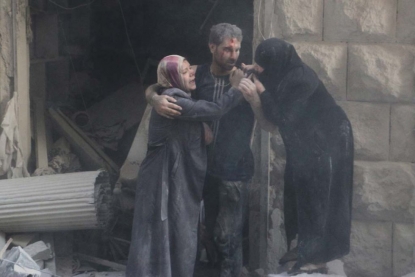
Moments after an air strike against Aleppo on July 15, 2014 (AFP / Baraa Al-Halabi)






